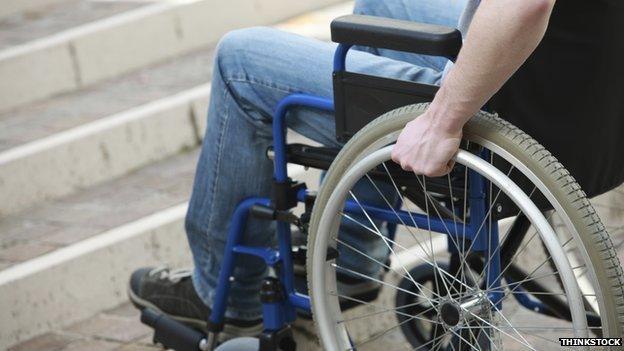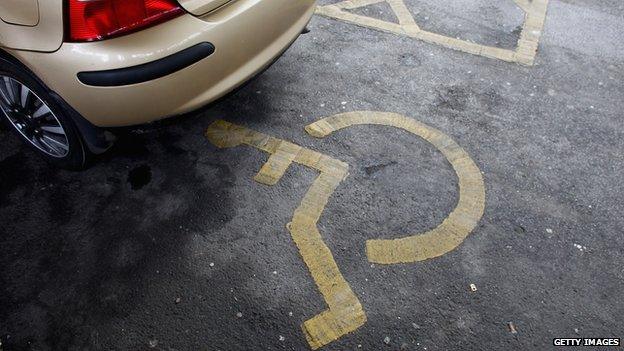First there was racism and sexism, now there's ableism
- Published

Disabled people have been tweeting their experiences of discrimination using the hashtag #StopAbleismBecause. But what is ableism? And why do UK activists use the word disablism instead?
What is it?
Ableism is a word which is increasingly being seen, especially on social media. It's a single word which people are using instead of the longer phrases "disability discrimination" or "disability prejudice".
Racial discrimination and gender discrimination have their own single words - racism and sexism - and so those ideas can be expressed a little more easily.
Disability discrimination is often complicated and misunderstood. At one end of the scale, buildings with steps instead of ramps may be said to be ableist. Less obvious perhaps is the notion ableism could be someone making assumptions about what disabled people can and cannot do. A person with ME might miss out on a party invite because the host assumes they aren't well enough to go, for instance. What may be kindness in the mind of one person is an act of exclusion to another.
Further, more obvious examples are "Knocking people's crutches deliberately, or taking hold of someone's wheelchair," says Becca who helps run the UK-based Twitter account @EverydayAbleism. Her project was inspired by the popular @EverydaySexism account which urges its followers to help them document little acts of degradation towards women.
Though sometimes thought as harmless, campaigners say they have a "drip drip drip effect" which cause unhappiness and maintain barriers to an equal life.
But does "disability discrimination" really need an 'ism?
Ableism is a relatively new term. It is thought to have emerged in the US in the early 80s, at the same time as the disability rights movement.
Disability commentator Simon Minty says he started to notice its use in the UK five years ago but only in academia, and by some activists.

"Most people get racism and sexism because it's a gut feeling or learned experience," says Minty. He says that people have more difficulty appreciating discrimination against disabled people because it's not just an attitude that needs changing, it's the built environment too.
But the word is only used by a small community and Minty says he only wants to adopt a single ism word if it falls in to common parlance.
Ableism? Disablism? Why are there two words?
"It comes down to emphasis," says US disability rights advocate and expert Lawrance Carter-Long, "as in who is being ism'd".
Disablism has its origins in the UK. Though the word itself isn't in the Oxford English Dictionary, it does have a listing for "disablist" saying that it's someone who is "discriminating or prejudiced against people who are disabled."
Ableism is in the OED though and listed as discrimination in favour of able-bodied people, with the example "we were fed up with the ableism of the women's movement." It is the preferred term in the US and Australia.
There's some debate about which of the words best fits the bill. Some people have no preference but neither is considered wrong. Many campaigners seem happy for ableism and disablism to be used interchangeably if it helps raise awareness of discrimination.
The debate about which is best has arisen recently as disabled people from different nations talk to each other on social media and use their own local words to describe the same thing.
Follow @BBCOuch, external on Twitter and on Facebook, external, and listen to our monthly talk show